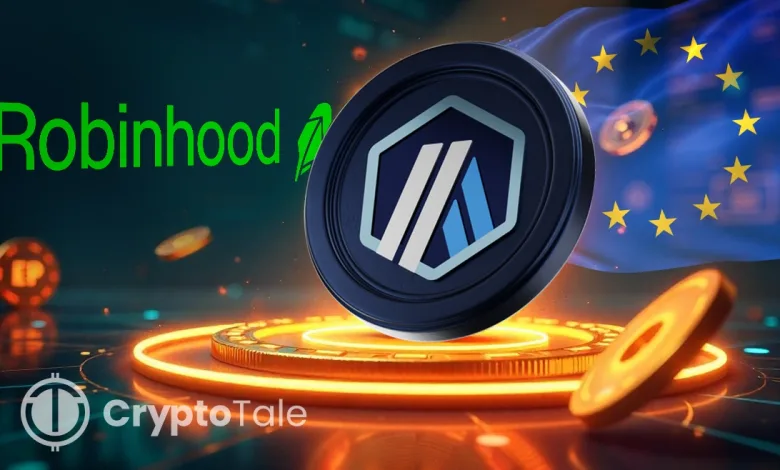Robinhood Mints OpenAI Stock Tokens, Expands On-Chain Equities

- OpenAI stock tokens mark Robinhood’s push to tokenize private equity on Arbitrum.
- Robinhood’s Arbitrum deployer has launched 213 stock and ETF tokens, hinting at wider plans.
- The project leverages Arbitrum to offer scalable, low-cost tokenized equity trading.
Robinhood EU has taken a significant step forward in its blockchain-based asset strategy by minting 2,309 OpenAI stock tokens through a deployer wallet on the Arbitrum network. These tokens are a sign that Robinhood is becoming more involved in decentralized finance and is attempting to expand its operations into new areas that are no longer based on traditional stock trading patterns.
The initiative is part of a wider project by Robinhood EU to bring private company shares to the blockchain. Blockchain data indicate that the same deployer has either tested or deployed 213 tokens on Arbitrum, a Layer 2 Ethereum solution. These include assets referencing high-profile companies such as SpaceX and Trump Media. Metadata has been assigned to 79 stock and ETF tokens, suggesting preparation for broader token distribution and availability for on-chain investors.
Utilizing Arbitrum for Scalable, Low-Cost Transactions
By selecting Arbitrum as the operational network, Robinhood benefits from the platform’s low transaction fees and increased scalability. Arbitrum is designed to handle large volumes of transactions while maintaining low costs and fast settlement times. This enables tokenized equities to function efficiently on-chain without the barriers that higher gas fees might impose on users.
Robinhood’s deployment strategy appears focused on leveraging these features to facilitate fractional ownership and continuous trading options. The blockchain infrastructure supports 24/5 market availability and potential dividend functionality for users interacting with tokenized stocks. These capabilities may offer new forms of asset accessibility for retail traders who were previously limited by geographical or financial constraints.
Market Response and Ongoing Industry Debate
While Robinhood’s tokenization efforts have drawn industry attention, they have also sparked discussions regarding the broader implications for the cryptocurrency sector. Some participants question whether capital allocated to tokenized equities will reduce liquidity within the altcoin market. Critics argue that blockchain-based access to established tech companies may divert investment away from lesser-known digital assets with limited use cases.
Several experts have voiced concern over the current tokenization model. Carlos Domingo, CEO of Securitize, has criticized the practice of issuing multiple blockchain versions of the same stock across platforms. He suggests this could lead to liquidity fragmentation and confusion for users. Domingo also referenced public comments from Robinhood’s crypto leadership that appeared to contradict the company’s current strategy, raising questions about internal consistency in messaging.
Alternative Use Cases and Cross-Ecosystem Expansion
Other blockchain projects are also embracing tokenized equities as a bridge between traditional and decentralized finance. Kamino Finance, based on the Solana network, recently introduced a system for trading tokenized versions of major stocks. These xStocks can be used as collateral in lending markets, expanding their utility beyond passive holding. Kamino’s offering includes assets such as USDC (USD Coin), USDT (Tether), and JUP (Jupiter), reflecting growing interest in blockchain-native equity representations.
The development of the cross-ecosystem indicates a trend within the DeFi market that is on the rise. Platforms are experimenting with how to incorporate traditional financial instruments without leaving the blockchain arena. Such advances may reshape the way investors handle crypto and equity products on a similar platform structure.
Related: Robinhood Expands in Europe with SpaceX and OPAI Tokens
Outlook for Tokenized Equities and Financial Infrastructure
Robinhood’s on-chain token deployment reflects an expanding use of blockchain technology in regulated finance. By initiating a diverse set of tokenized stock and ETF assets, the platform is positioning itself within a developing digital market infrastructure. The integration of private equities, such as those of OpenAI and SpaceX, further suggests an intention to bring traditionally illiquid assets to a broader audience.
Although certain aspects of the model are still being questioned, particularly in terms of legal transparency and asset securitization, the approach taken by Robinhood EU suggests that a functioning marketplace for tokenized securities can be created. With the maturation of blockchain solutions, businesses involved in such projects have the opportunity to shape the future relationship between digital and traditional finance systems.




